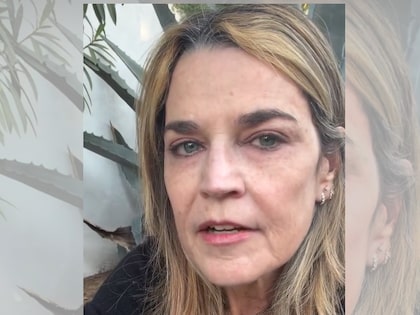Celebrity News January 09, 2025
Anita Bryant, Singer Who Became Anti-Gay Firebrand, Dead at 84
 Getty Images
Getty Images
Anita Bryant, the beauty queen and singer who pivoted in the '70s to became the most outspoken anti-gay activist in the U.S., has died at 84.
According to a public obituary placed by her family, Bryant — known as Anita Bryant Dry — died December 16 at her Edmond, Oklahoma, home.
Bryant, a onetime Miss Oklahoma and Christian pop star, was for a spell best known as the singing spokeswoman for the Florida Citrus Commission. Her rendition of "Come to the Florida Sunshine Tree" in TV commercials brought her household recognition.
In 1977, she threw herself into her "Save Our Children" movement to fight a historic Miami-Dade County ordinance that prohibited discrimination on the basis of sexual orientation.
Under the guise of protecting children, she was successful in getting the ordinance overturned (it lasted more than 20 years before being repealed), then expanded her work to fight LGBTQ rights in any form, banding together with fellow conservatives like the Rev. Jerry Falwell, whose Moral Majority worked against gay rights, abortion rights, and more.
In 1977, she was famously pied in the face by gay activist Thom Higgins in Des Moines, Iowa. She immediately said, "At least it's a fruit pie," and her husband, DJ Bob Green, urged that Higgins be left alone so they could pray for his soul.
In 1978, she inspired the Briggs Initiative in California, an early "Don't Say Gay" proposal that would have banned pro-gay statements by any public school employee. Opposed by liberals and even by former Republican Gov. Ronald Reagan, it was soundly defeated.
Her anti-gay crusade drew more attention than she'd ever received before, much of it negative. Bryant told Playboy in 1978, "You know, when I was a child, you didn’t even mention the word 'homosexual,' much less find out what the act was about. You knew it was very bad, but you couldn’t imagine what they tried to do, exactly, in terms of one taking a male role and the other taking a female role. I mean, it was too filthy to think about, and you had other things to think about. So, when I finally found out all the implications, it was a total revelation for me.”
Her work also led to the banning of gay adoption in the state of Florida for more than 30 years.
By 1980, her politics were too toxic for the Florida Citrus Commission, which decided against renewing her lucrative contract. She lost many other gigs as well, and was the focus of protests. By her own estimation, she lost $500,000 in revenue over her position.
Bryant's career was in freefall by 1980, but her divorce had as much to do with it as her anti-gay stance — her fans were extremely religious and rejected her for splitting with her husband. She performed in the 1990s in Branson, Missouri, but ran into tax woes. With new husband Charlie Hobson Dry, she opened Anita Bryant's Music Mansion in Pigeon Forge, Tennessee. It failed in 2001.
Born March 25, 1940, in Barndsdall, Oklahoma, she and her family moved to Oklahoma City, where she recorded her first song in 1953. She soon after made her TV debut and was signed as a pop singer right out of high school.
First, she was crowned Miss Tulsa and then Miss Oklahoma, but lost Miss America in 1959 to Mary Ann Mobley.
Her self-titled debut album was released that same year, and she went on to release more than two dozen more, many of them gospel in nature.
Before she became Evangelical, Bryant enjoyed a number of secular hits on the Billboard Hot 100, most famously "Till There Was You" (1959) and the Top 5 hit "Paper Roses" (1960), later covered just as successfully by similarly "all-American" Marie Osmond.
Her rendition of "Battle Hymn of the Republic" so charmed former President Lyndon B. Johnson, he requested she perform it at his funeral — which she did in 1973.
Preceded in death by her second husband, she is survived by her four children, two stepchildren, and seven grandchildren.






















